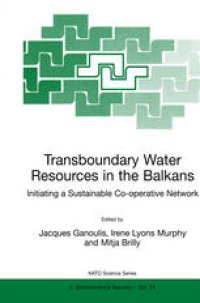
Ebook: Transboundary Water Resources in the Balkans: Initiating a Sustainable Co-operative Network
- Tags: Hydrogeology, Waste Water Technology / Water Pollution Control / Water Management / Aquatic Pollution, Environmental Management
- Series: NATO Science Series 74
- Year: 2000
- Publisher: Springer Netherlands
- Edition: 1
- Language: English
- pdf
A source of up-to-date information on current water resources, their quality and quantity, in every country in the Balkans. Institutional structures, water management issues and water monitoring problems are analyzed, with special reference to international waters, using characteristic case studies, including the Sava River, Lake Ohrid, The Nestos/Mesta River, the Neretva River estuary, and coastal waters in Turkey. Contributions written by experts from France, the UK and the USA demonstrate state-of-the-art electronic networking and the management of distributed water databases.
The protection of water resources in the Balkans has become a high profile issue since the collapse of communism in the area, the break up of former Yugoslavia, and ethnic tensions in Kosovo. Transboundary river pollution and the development of international water basins call demand urgent regional co-operation, which will be facilitated by the International Network of Water-Environment Centres for the Balkans, the initiation of which is described in the final conclusions of the book.
A source of up-to-date information on current water resources, their quality and quantity, in every country in the Balkans. Institutional structures, water management issues and water monitoring problems are analyzed, with special reference to international waters, using characteristic case studies, including the Sava River, Lake Ohrid, The Nestos/Mesta River, the Neretva River estuary, and coastal waters in Turkey. Contributions written by experts from France, the UK and the USA demonstrate state-of-the-art electronic networking and the management of distributed water databases.
The protection of water resources in the Balkans has become a high profile issue since the collapse of communism in the area, the break up of former Yugoslavia, and ethnic tensions in Kosovo. Transboundary river pollution and the development of international water basins call demand urgent regional co-operation, which will be facilitated by the International Network of Water-Environment Centres for the Balkans, the initiation of which is described in the final conclusions of the book.